
Edited on 04.04.2024
The healthcare IT outsourcing landscape has transformed, marking a shift towards growth. In recent years, the focus moved from saving costs to forging strategic partnerships that boost efficiency, security, and patient care. This change was driven by the need to manage vast datasets and ensure compatibility, leading to more reliance on cloud services, telemedicine, and analytics.
Content:
- Healthcare transformation with IT outsourcing solutions
- Healthcare leaders choosing IT outsourcing
- Software and digital services delegated to IT vendors
- IT healthcare outsourcing trends worldwide
- How outsourcing can improve healthcare operations?
- Outsourcing healthcare software with MWDN
As 2024 unfolds, the sector is set for expansion, driven by faster digital adoption, AI in healthcare, and a focus on personalized care. However, navigating data privacy, regulatory demands, and the need for specialized services will be crucial for leveraging outsourcing’s full potential and sparking significant innovation in healthcare IT.
Healthcare transformation with IT outsourcing solutions
The healthcare IT outsourcing market is pivotal for enhancing operations, patient care, and cost savings. Facing complex systems and a need for advanced tech, outsourcing grants access to specialized skills and innovation. It supports the management of EHRs, cybersecurity, telemedicine, and analytics, freeing up resources for core healthcare tasks.
Outsourcing offers the scalability and adaptability needed in the healthcare sector. It aids digital transition, reduces operational stress, and improves care outcomes. This approach is quite efficient in optimizing healthcare operations, enriching patient experiences, and fostering innovation in healthcare.
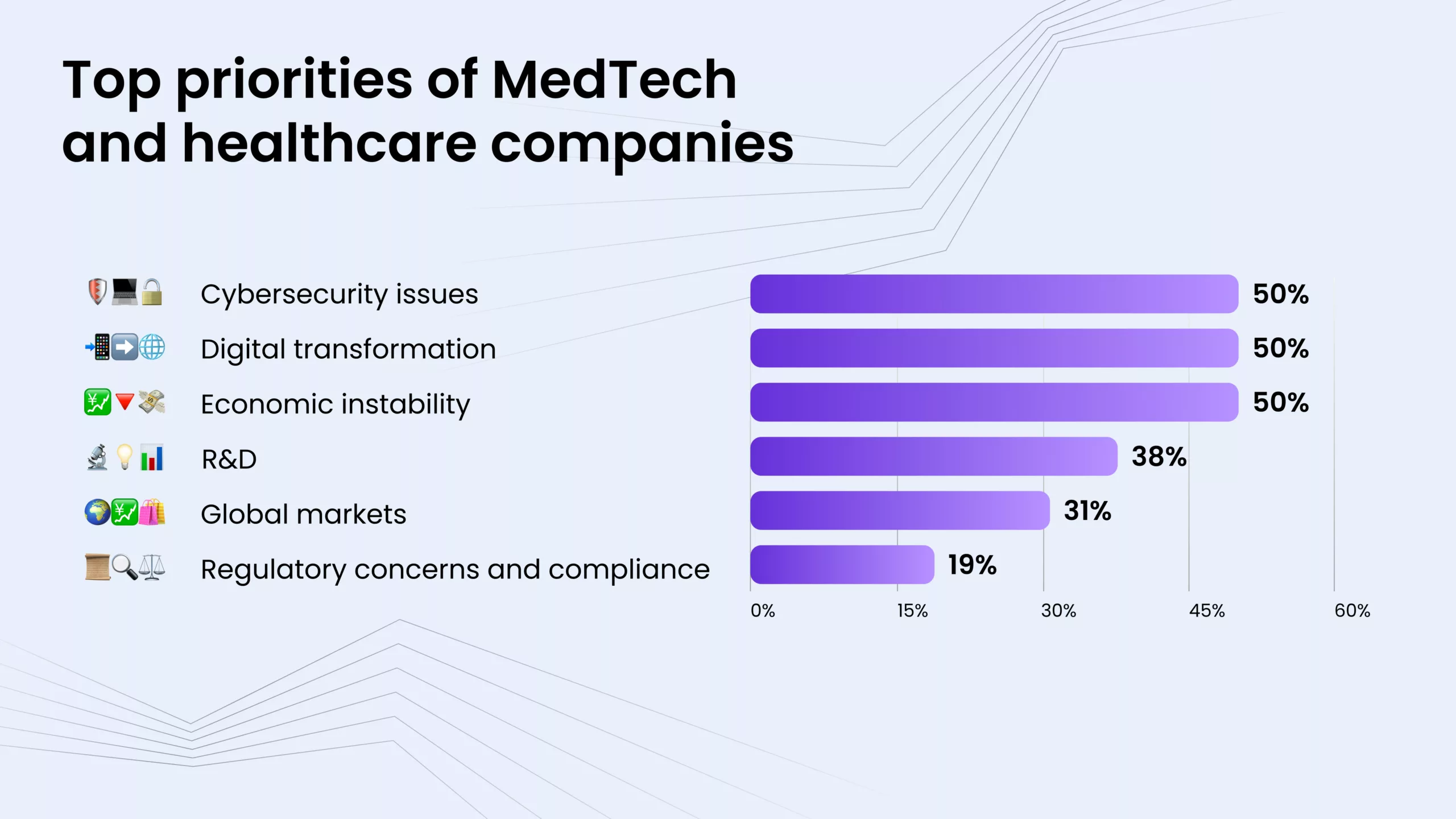
Source: Deloitte
As technology advances, healthcare executives understand that outsourcing tech services can drastically cut operational expenses. The challenge, however, lies in the scarcity of digitally proficient resources in the healthcare sector. This gap underscores why business process outsourcing is crucial to healthcare strategies. Those yet to embrace the benefits of outsourcing should recognize which services are commonly entrusted to external experts and the reasons behind this trend.
Healthcare leaders choosing IT outsourcing
If you still doubt whether you should outsource healthcare software development, take a look at industry leaders who already do it.
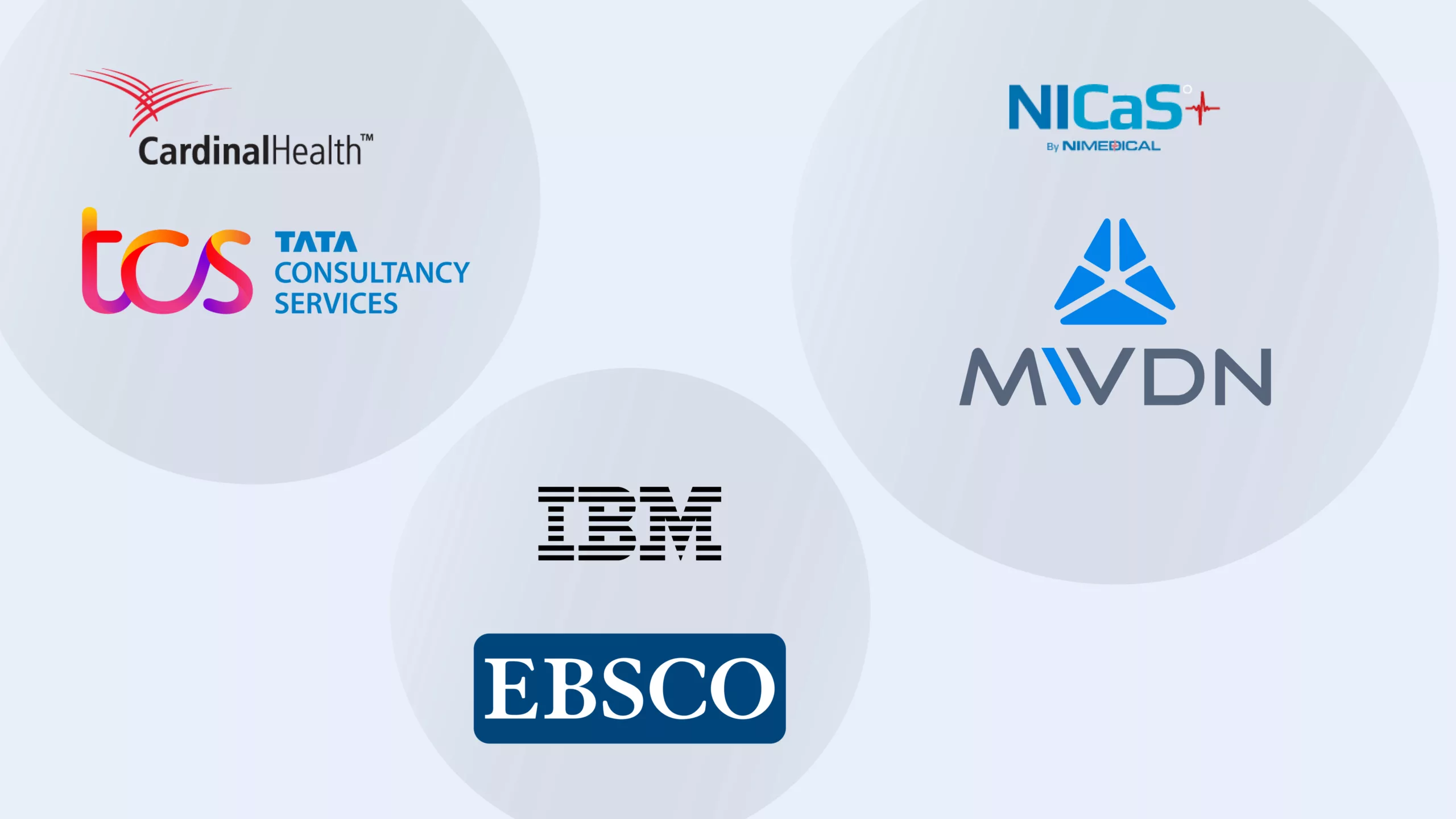
In November 2019, India-based TCS broadened its collaboration with Cardinal Health to overhaul its IT frameworks, aiming for a product-focused approach. Leveraging TCS’s machine-first delivery model and enterprise Agile strategy, Cardinal Health seeks to boost business flexibility and drive ongoing innovation.
In March 2020, IBM Healthcare partnered with EBSCO Information Services to optimize healthcare operations and clinical decision-making. This partnership integrates DynaMed and IBM Micromedex with Watson into a unified suite, providing evidence-based clinical insights.
Since 2007, Israeli-based NICaS by Nimedical has collaborated with MWDN on its EHR, medical billing, and medical coding solutions. As its IT staff augmentation partner, MWDN provided NICaS with software developers, designers, and other digital experts.
Software and digital services delegated to IT vendors
In 2024, MedTech and digital healthcare companies continue to evolve, leveraging IT outsourcing to enhance their capabilities. These are some IT services commonly outsourced by medical companies to IT vendors.
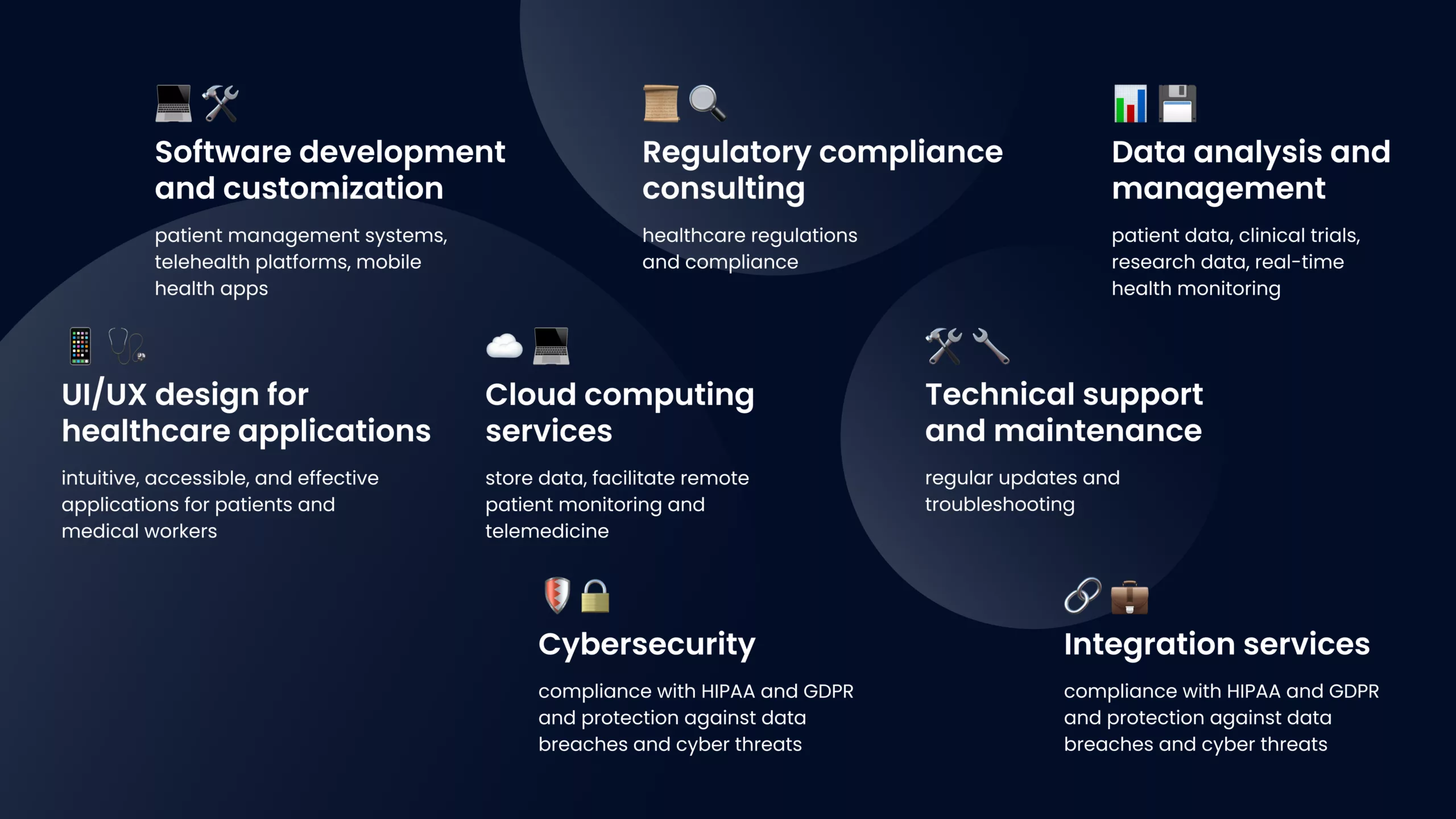
Let’s get through some of them in more detail.
Cybersecurity vulnerabilities and data storage challenges
In embracing digital transformation through IT outsourcing, the healthcare sector has made data an invaluable asset. However, this shift has heightened the industry’s risk of ransomware attacks and cybersecurity breaches.
A notable example occurred in April 2020, when Cognizant suffered a significant “Maze” ransomware attack, affecting not only the company but also its clients, with recovery costs anticipated to be around US$ 70 million. Such cybersecurity threats pose potential setbacks for the growth of healthcare IT outsourcing.
Additionally, the healthcare field generates vast quantities of data from daily operations, complicating the management, storage, and retrieval of electronic data. IT outsourcing services, which handle various data processes, including patient and payment records, along with remote monitoring systems, face the challenge of ensuring operational efficiency without a solid data storage solution. This presents a considerable challenge for stakeholders in the healthcare IT outsourcing arena.
Outsourcing IT Infrastructure for healthcare entities
Outsourcing IT infrastructure significantly boosts the healthcare IT outsourcing market, acting as the essential technological foundation for healthcare companies. It allows healthcare organizations to concentrate on their primary functions and patient services by entrusting the upkeep of their IT infrastructure to expert providers.
This approach offers cost savings, scalability, and access to the latest technologies—vital for a sector reliant on data analytics and strict regulations. Outsourcing ensures uninterrupted access to electronic health records, efficient communication networks, and strong cybersecurity, positioning it as a key strategy for enhancing healthcare IT operations.
Data analysis for pharmaceutical success
Pharma and life science research lead the way in IT outsourcing by driving innovation and demanding tailored solutions. Outsourcing offers the expertise and flexibility needed to handle complex data, advance drug discovery, and navigate regulatory hurdles.
Specialized IT services like
- data analysis,
- advanced computing, and
- cloud technologies
support research entities by streamlining tasks and quickening outcomes. The sector’s deep engagement with cutting-edge tech and its evolving, dynamic demands amplify the need for external IT services. Consequently, pharma and life sciences pioneers in adopting outsourcing to enhance efficiency, speed up research, and secure a market edge.
EHR management outsourcing
EHR systems digitize traditional paper charts, speeding up administrative and operational tasks by organizing documents and reducing paper clutter. They enable the conversion of documents into an accessible format for departments, patients, or institutions.
A survey by EHR Intelligence found that one-third of health IT leaders prioritize EHR implementation and clinical applications in their outsourcing efforts. EHRs integrate various features, including electronic health records, patient and staff portals, scheduling tools, and billing integration.
A well-designed EHR enhances patient care and facility efficiency by reducing medical errors, increasing record accuracy, empowering patients with the knowledge to make better decisions, decreasing redundant tests, speeding up treatment, and making health data readily available.
Outsourcing medical billing, medical coding, and claim management
Efficient revenue cycle management is critical, relying on the accurate submission of medical bills and swift claim reimbursements. Given that approximately 80% of medical bills have errors, the complexity of manual billing and coding processes often leads to significant revenue losses for American hospitals, sometimes up to 20-30%. Outsourcing to specialized billing and coding services and adopting custom software can help overcome these challenges.
Healthcare facilities increasingly turn to outsourcing their billing and coding for:
- More accurate and cost-effective claim processing
- Ensured regulatory compliance
- Enhanced coding precision
A medical claim with detailed diagnoses and procedures from a patient visit is needed to verify insurance coverage. Yet, nearly half of all Medicare claims also have errors. Simplifying and automating claim management through specialized software not only safeguards patient data but also significantly accelerates the claims process, boosting a facility’s profitability.
Digital patient record system and data entry
Establishing a digital patient record system needs the accurate capture and input of data. It’s important to note that data entry in healthcare is significantly more intricate compared to other sectors. Research on clinical database errors reveals that error rates, identified through dual-entry verification, vary between 2.3% and 26.9%.
Automating the data entry process becomes essential with the growing volume of patient data and the variety of data input needs. Consequently, healthcare institutions are turning to external providers capable of incorporating artificial intelligence to streamline the data entry workflow.
Automating revenue cycle operations can lead to healthcare savings of up to $11.5 million. Outsourcing IT to specialized healthcare software development firms is a reliable method to achieve this. The adoption of AI, IoT, big data, and other cutting-edge technologies not only enhances diagnostic accuracy but also significantly improves patient care. Similarly, on the business front, these technologies boost process efficiency, streamline the revenue cycle, and reduce human errors in tasks that were previously manual and labor-intensive.
IT healthcare outsourcing trends worldwide
Outsourcing healthcare is not homogenous around the globe, FMI states.
In the US, healthcare firms increasingly turn to third-party tech services to enhance IT operations, driven by the demand for cutting-edge tech, affordability, and compliance. Challenges like data privacy and system integration persist, presenting both hurdles and chances for growth.
China’s healthcare sector is outsourcing IT to focus on patient care and tap into expert, cost-effective tech solutions. The push for modernization and digital health adoption fuels growth, while data security and regulatory challenges demand a careful balance between innovation and information protection.
The UK’s healthcare IT outsourcing is focused on enhancing patient services through techs like EHR management and data analytics. Driven by digital innovation and the need for efficiency, the sector faces ongoing challenges with data privacy and system compatibility, steering the market’s evolution.
HOW OUTSOURCING CAN IMPROVE HEALTHCARE OPERATIONS?
1. Cost efficiency
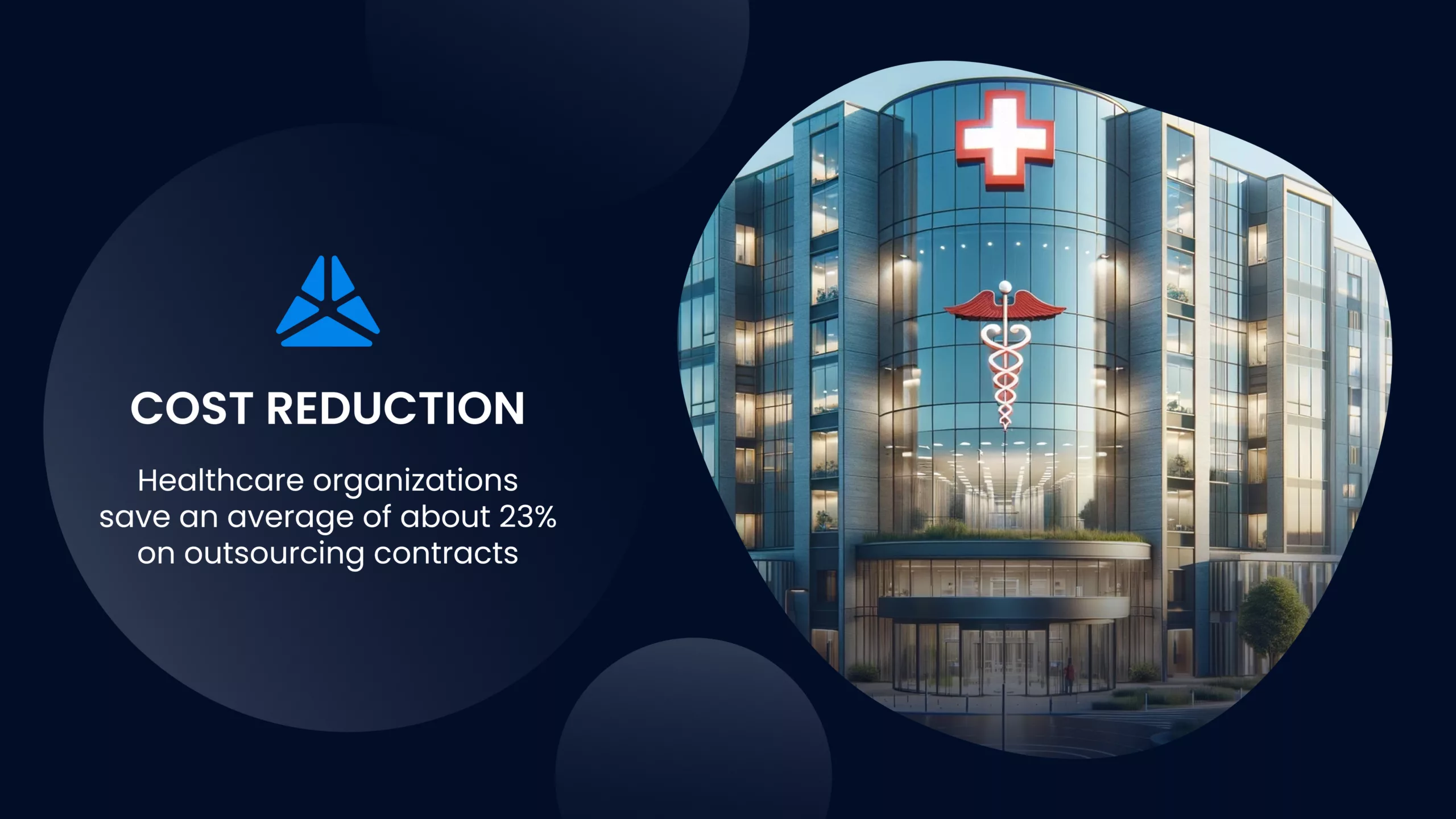
Gartner reports that healthcare organizations can save an average of 23% through outsourcing contracts. By choosing to outsource, healthcare facilities can hand off various administrative duties such as network infrastructure, service desk, application support, and legacy system maintenance to qualified third-party experts. IT outsourcing firms can provide a dedicated team of skilled specialists to healthcare providers, ensuring continuous innovation.
Outsourcing allows a service partner to manage a team of professionals on behalf of the customer, significantly reducing the costs associated with hiring and training new employees. Moreover, clients don’t have to manage the support needs of their new team—taxes, retention, and other HR responsibilities are all taken care of by the outsourcing service provider.
2. Enhanced scalability and access to top talent
As healthcare facilities look to scale their operations or products, they often require support in finance, technology, and analytics, necessitating a significant expansion of resources, deep expertise in specific fields, and an understanding of local market regulations. Outsourcing enables healthcare organizations to augment their capacity efficiently by offering access to skilled specialists in front-end, mid-cycle, and back-end roles across the necessary fields and technologies. This support ensures improved scalability and facilitates smoother adjustments to market changes.
3. Error reduction and streamlined medical billing
Minor mistakes in medical documentation can significantly delay insurance payments, not just by days but potentially weeks. Manual operations are particularly prone to errors, such as misspelled names, incorrect dates, or numbers, leading to extra costs and delays. Outsourcing medical billing to tech experts who can automate these processes minimizes these costly billing errors. An outsourcing partner equips healthcare facilities with various technologies to lighten the administrative load, directly contributing to better patient care outcomes.
Outsourcing healthcare software with MWDN
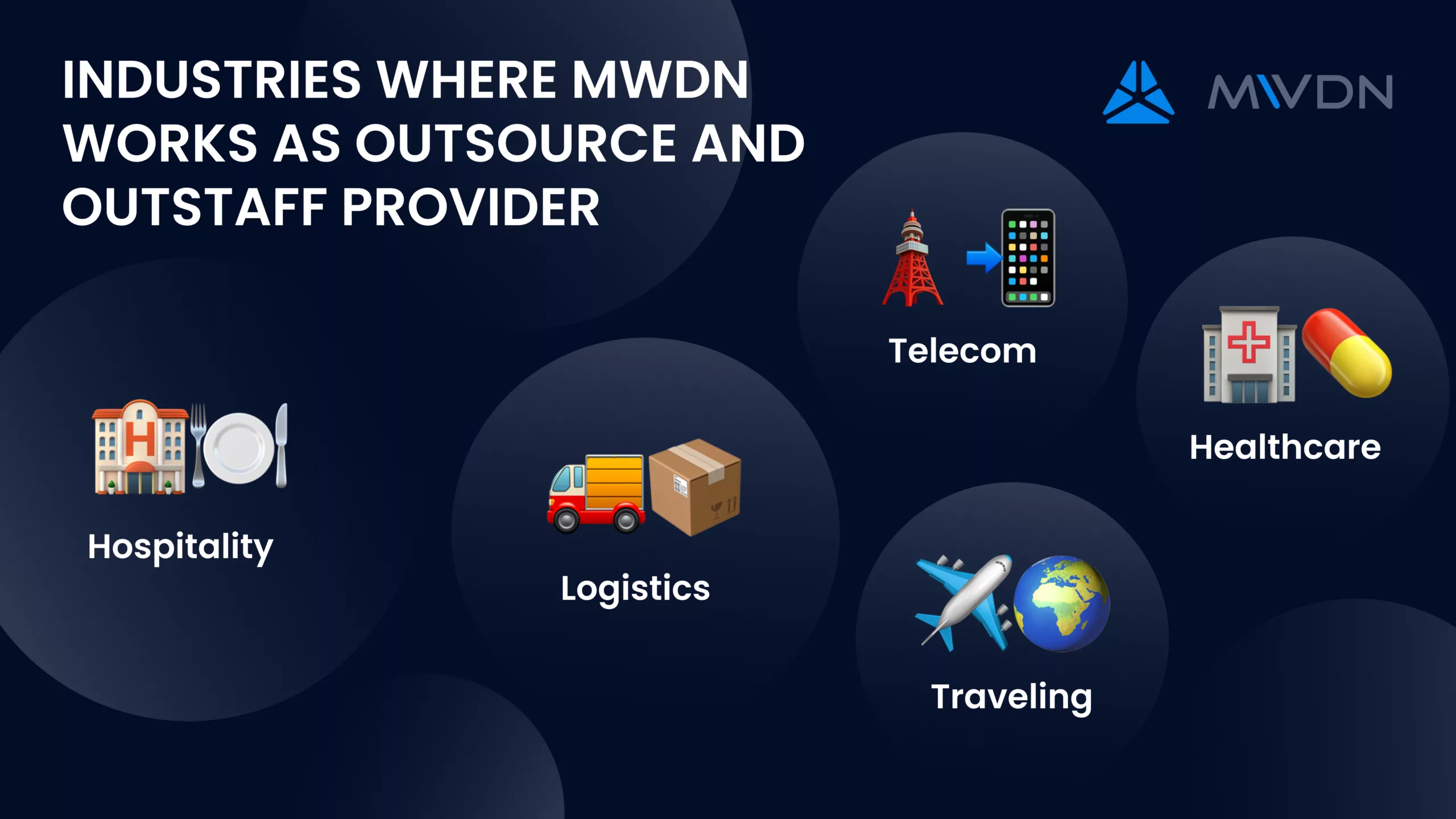
Outsourcing and incorporating tech experts allows healthcare to prioritize its main goal: quality patient care. It enables facilities to save time, cut costs, and adapt quickly in a complex, regulated market. However, outsourcing demands secure, HIPAA-compliant services from skilled specialists, making the choice of provider crucial.
MWDN, with over 20 years of experience, offers innovative solutions and expertise in healthcare and other sectors. We develop web and mobile applications and custom software. We offer a flexible hiring model, providing a skilled IT workforce to strengthen teams globally.
Content
- 1 Healthcare transformation with IT outsourcing solutions
- 2 Healthcare leaders choosing IT outsourcing
- 3 Software and digital services delegated to IT vendors
- 3.1 Cybersecurity vulnerabilities and data storage challenges
- 3.2 Outsourcing IT Infrastructure for healthcare entities
- 3.3 Data analysis for pharmaceutical success
- 3.4 EHR management outsourcing
- 3.5 Outsourcing medical billing, medical coding, and claim management
- 3.6 Digital patient record system and data entry
- 4 IT healthcare outsourcing trends worldwide
- 5 HOW OUTSOURCING CAN IMPROVE HEALTHCARE OPERATIONS?
- 6 Outsourcing healthcare software with MWDN


